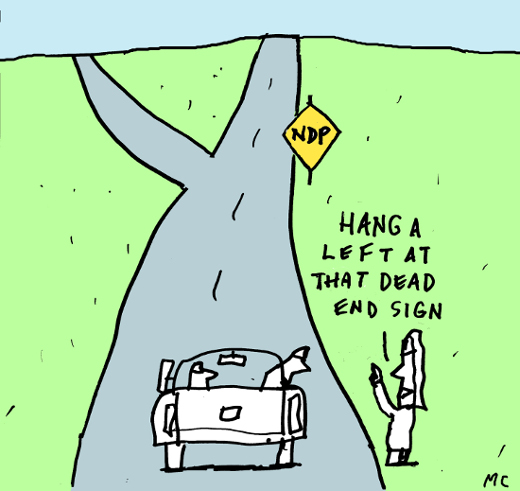Dru Oja Jay and Nav Kaur are absolutely right about what left electoral campaigns can sometimes accomplish in terms of education and mobilization. And their caution that there’s an enormous difference between “winning victories in debates” and “facing down international capital” is vital. But should we be working “to turn the NDP into a party that is willing and able to confront capital and win”? I think not.
It does matter who leads the NDP. A win by Niki Ashton would be a blow to the party establishment because, as they note, she’s been the most vocal left critic of the NDP status quo. The emergence of a dynamic new left inside the NDP would be welcome (and should affect the tactics of radicals). But I don’t see either as likely anytime soon, sadly. Political circumstances in Canada today are different in important ways from those that made Corbyn’s election as Labour leader and the Sanders campaign possible.
If we take “getting into a confrontation with capital with a real possibility of winning at least a partial victory — something that can begin to turn the tide” as a strategic goal, then our top priority should be organizing in workplaces and communities and on campuses to build power through collective action.
The reason is simple: it takes a lot of power to win even partial victories. That’s one lesson we should take from the 2012 student movement in Quebec (which made Gabriel Nadeau-Dubois, recently elected as a Quebec Solidaire MNA, so popular). That kind of power can only come from disruptive mass mobilization that’s driven by grassroots organizing and becomes infectious, drawing in many people who’ve never before been involved in anything like it.
The $15 and Fairness campaign in Ontario deserves credit for pushing a weak provincial government to boost the minimum wage and improve workers’ rights. But let’s not kid ourselves: to win far-reaching changes will take mightier organizing and mobilizing. Naomi Klein is right: “only mass social movements can save us.”
That’s true whether it’s the NDP or another party that forms the government. I think Dru and Nav’s article really underestimates the obstacles to changing the NDP. The party is highly undemocratic and the people who control it would do all they could to crush a left force that threatened their grip, as they did with the Waffle in 1972.
Even if radicals somehow took over the NDP and the federal NDP formed government, it would be in office, not in power. A left-led NDP government would buckle under the pressure of its enemies — capitalists who’d refuse to invest, top state managers, the pressure of bond and currency markets — as SYRIZA did in Greece in 2015 unless it was driven forward by a powerful social movement that it couldn’t control.
Unfortunately, the forces that understand what kind of struggle will be needed and are working with others to build power are very weak in Canada. How we relate to the NDP (and Quebec Solidaire too) should be shaped by the goals of strengthening these political forces and social movement organizing. We should work towards a political organization of a new type, one that brings together like-minded people (whether they’re members of the NDP or not) to build movements and argue for anti-capitalist politics.
David Camfield is the author of the forthcoming We Can Do Better: Ideas for Changing Society and a member of Solidarity Winnipeg (this article is written in personal capacity).
For earlier articles in this series see
And


